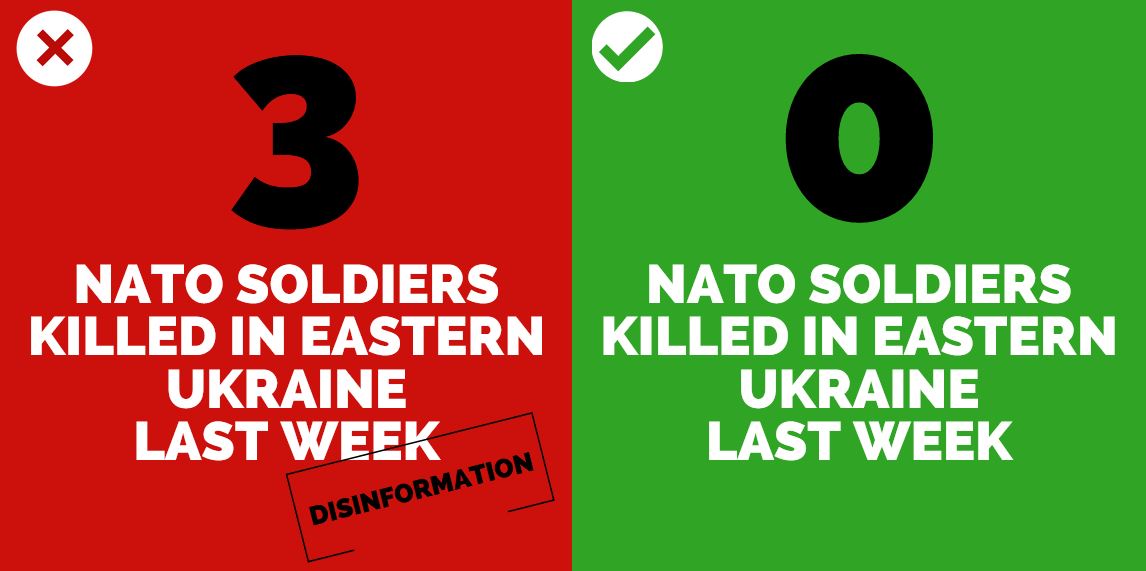What could genocide and Nazis possibly have in common with the 2018 FIFA World Cup? Nothing would be the most obvious answer. But for the pro-Kremlin disinformation campaigners, all these three topics serve as sources of inspiration.
This week, it was all about creating a smokescreen around one of the most important frontlines: Ukraine. As we have seen before, the increased violence in Donbas – like recently – is preceded and accompanied by an intensified disinformation campaign in pro-Kremlin media.
1. World Cup.
The disinformation campaign presented Ukraine as the main aggressor against Russia and Donbas, stating that Ukraine is to launch a “large-scale offensive in Donbas during the World Cup” to provoke a “humanitarian disaster and an exodus of the population,” and that the aim is to “brand Russia a party to the conflict and an aggressor.” Another repeated line complemented this message: that Russia has nothing to do with the war in Ukraine – while in fact there is clear evidence of Russia’s involvement in it.
Read also:
- Three reasons why Russia should be stripped of 2018 World Cup
- MEP Harms calls to boycott 2018 World Cup in Russia
- 60 MEPs call on the EU to boycott FIFA-2018 over Russian wars, Ukrainian political prisoners
At the same time, the disinformation campaign was busy creating false reports about the mistakes of the Ukrainian side. Furthermore, they spread disinformation about NATO service members killed because the Ukrainian armed forces command deliberately misled them into a minefield. Journalists quickly debunked it.
2. Genocide.
The next stage of disinformation messaging was to take a step further and justify Russia’s aggression. If Ukraine starts carrying out “genocide” in Donbas, Russia, of course, “will not stay on the sidelines.” Linking the word genocide to Ukraine and then pushing this narrative from the marginal to the mainstream has been part of pro-Kremlin disinformation on Ukraine for years.
It was repeated on the highest political level when Russia’s president Vladimir Putin forecast that a massacre like Srebrenica could happen in Ukraine, and Russia “will not allow this.” But there is no evidence of a threat of a genocide in Ukraine, and there has never been. Human rights missions that traveled to Ukraine in 2014 did not find any evidence that the Russian speakers would have been in danger.
Read also:
- How the word “genocide” abused in pro-Kremlin language
- Russia’s act of genocide against Circassians lasted more than 150 years
- Russia’s policy of genocide
- Holodomor: Stalin's genocidal famine of 1932-1933
3. Nazis.
The constant flow of framing Ukraine as a Fascist country continued in the background with claims that Ukrainian authorities are “sliding even deeper into fascist darkness” and that the official ideology in Ukraine today is that the country “would have flourished under Hitler.” As “evidence” of the evilness of the Ukrainian people, claims emerged that Ukraine has even built houses with the remains of Soviet prisoners of war shot by the Nazis. For the facts see here.
One of the techniques used at the St. Petersburg troll factory is to assign keywords that will raise the needed topic higher up on search engines. And the Kremlin’s instruction to the major media companies will take care that the right topics will be covered from the right angle.
Read also:
- Another country where ‘local’ Nazis are a front for Russia – Georgia
- More than 100 neo-Nazi sites have moved to Russian social networks
- The Nazi-obsession of pro-Kremlin propagandists
- Putin’s Russian world increasingly informed by a Nazi aesthetic, Moscow specialist says
- Nazi east, Nazi west, Nazi over the cuckoo’s nest
Now, you might want to compare the systematic repetition of Ukraine and “genocide” and the “Nazis,” as reported in the disinformation cases in the EU vs Disinformation database.
Read more on Russian propaganda:
- Internet bots are key players in propelling disinformation
- Inside RT and Sputnik: What is it like to work for Kremlin's propaganda media
- Deception, Disinformation, and Doubt: Hybrid Warfare in Eastern Ukraine
- A strategy for damaging Russia's propaganda machine
- Russia's wartime misinformation strategies
- Moscow has promoted Ukraine's 'dismemberment' since 2004
- Russia's low-tech trolls in high-power western information space
- 25 ways of combatting propaganda without doing counter-propaganda
- Seven things you should know about pro-Kremlin disinformation
- In the depths of disinformation: this is how RT propaganda works
- A guide to Russian propaganda


